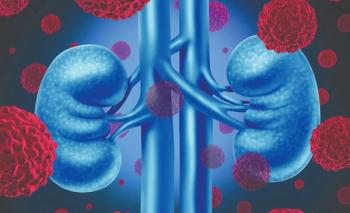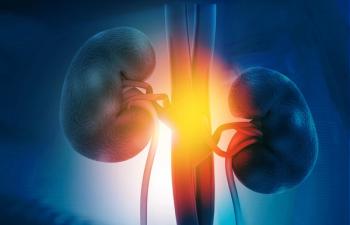
Current Prognoses With Metastatic Renal Cell Carcinoma
Before closing out their review of the first clinical scenario, panelists consider the general state of prognoses within metastatic renal cell carcinoma.
Episodes in this series

Transcript:
Chung-Han Lee, MD, PhD: Overall, this patient with poor-risk disease was started on a TKI [tyrosine kinase inhibitor]/IO [immuno-oncology] combination with lenvatinib [Lenvima] plus pembrolizumab [Keytruda]. This is a regimen that’s demonstrated kind of quite high activities in terms of from a directive response rate standpoint, from a PFS [progression-free survival] standpoint, and an overall survival standpoint. Even though they are within the category of having poor-risk disease, I think that the outcomes certainly are much better than what they used to be, especially with these types of combination therapies.
Christine Anderson, NP: Oh, absolutely. Thinking when I started as an NP [nurse practitioner] the treatment options have really kind of expanded and come a long way.
Chung-Han Lee, MD, PhD: Patty, for you being on the forefront as a clinical trial nurse what have you seen in terms of how the treatments have really impacted patients’ lives?
Patricia Fischer, Research Nurse: Definitely people are living longer with these therapies and finding the right dose for them is so important, as you were just talking about. When we start them, it’s 1 dose for everyone, whether you’re 6’4” or 5’2”, and everybody tolerates therapies differently. We want to keep that in mind and support them through their first 2 cycles as best we can to then find the best dose for them to hopefully be able to take the medication continuously without too many interruptions or side effects, because they are on it for months or years.
Chung-Han Lee, MD, PhD: And what have you seen from a in terms of a tolerability standpoint, after you get to the dose in which is tolerable?
Patricia Fischer, Research Nurse: From the beginning, I tell patients we want them to keep doing all the things that they want to do. So if that means working full-time and taking your vacations, then we will support you to do that. That’s part of helping them tolerate the therapy so that they’re not stuck at home with diarrhea or extra visits to the doctor because their blood pressure is too high, and most people are able to keep doing those things.
Chung-Han Lee, MD, PhD: Outstanding. I think it’s important to remind the patients that the goal of all these medications is to make them feel better. The goal is not to make them feel sick and unable to do the things that they enjoy.
Patricia Fischer, Research Nurse: They like to hear that.
Transcript edited for clarity.
Newsletter
Stay up to date on recent advances in the multidisciplinary approach to cancer.
























































